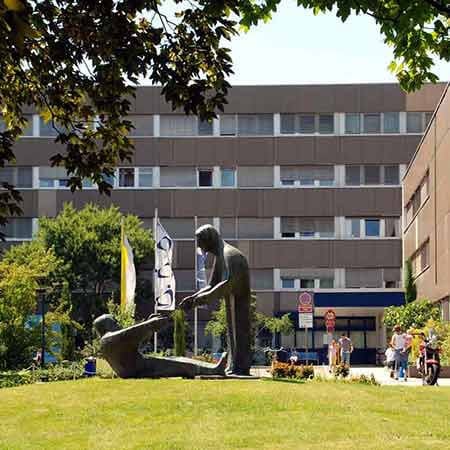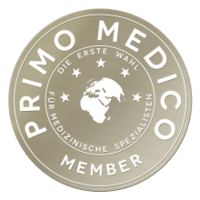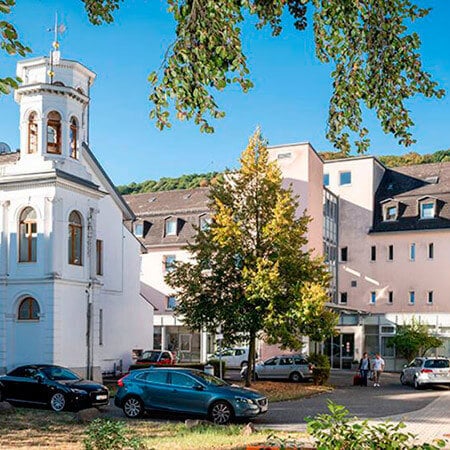Rectal Cancer: Treatment with Radiation and Chemotherapy in the best Hospitals in the world
Treatment prices are regulated by national law of the corresponding countries, but can also include additional hospital coefficients. In order to receive the individual cost calculation, please send us the request and medical records.

Department of Hematology and Oncology
The Department of Hematology and Oncology treats solid malignant tumors of various localizations, blood cancer, and benign hematopoietic pathologies. A qualified team consisting of oncologists, hematologists, psycho-oncologists, physiotherapists, and experienced nursing staff takes care of the health of patients. Whenever required, doctors from related medical fields are also involved in the therapeutic process. All specialists make every effort to provide patients with effective and personalized medical services while surrounding them with care. The department is part of the Cancer Center of the hospital, which is certified according to the requirements of the German Cancer Society (DKG). The department prefers a multidisciplinary approach, holding weekly tumor boards with the participation of oncologists, hematologists, radiation therapists, and surgeons, as well as highly specialized experts in gynecology, urology, gastroenterology, pulmonology, etc. The department's specialists have in their arsenal modern treatment methods for malignant diseases, including chemotherapy, targeted therapy, immunotherapy, hormone therapy, and many others. Patients with advanced stages of cancer are offered palliative care aimed at alleviating pain syndrome and ensuring a decent quality of life.




Department of Oncology and Palliative Care
The Department of Oncology and Palliative Care provides palliative treatment for patients with incurable diseases. The goal of the department's physicians is to alleviate the symptoms of the disease and improve the quality of life. The department's specialists take an individual approach to each patient, always respecting the patient's wishes. A competent multidisciplinary team, consisting of palliative care specialists, nurses, psycho-oncologists, physiotherapists and social workers, works here for the benefit of the patients.





Department of Oncology and Surgical Oncology
The Department of Oncology and Surgical Oncology specializes in the conservative and surgical treatment of the full range of cancers. The department is one of the leading in the field of its competence in the international medical arena and treats patients with especially complex clinical cases. The priority focuses of the department's medical team include regional chemotherapy, hyperthermia, immunotherapy, surgical oncology and pain therapy. The goal of the department's doctors is to achieve an optimal therapeutic result with minimal damage to the healthy tissues.

Rectal cancer can be treated using surgery, chemotherapy and radiation therapy. These techniques can be used in different combinations and in different sequence, depending on the tumor size, the degree of its spread to the neighboring organs and tissues, the presence of metastasis in the nearest lymph nodes or distant areas of the body.
At what stages can chemotherapy and irradiation be applied?
The treatment of colon cancer differs according to the stages of the disease.
Stage 0. A surgical intervention is enough to treat cancer. The doctors should not use chemotherapy or radiation to treat rectal cancer after surgery.
Stage 1. In most cases, the doctors perform only surgical intervention. Cancer chemotherapy can rarely be used as well. However, it can become an option of choice only in the cases when the doctor finds out that the tumor has spread further than it was expected before the treatment. If chemotherapy is contraindicated for a person, cancer radiation may be prescribed. Its tolerance is better, but its effectiveness is lower.
Stage 2. The first treatment method can be both radiation and chemotherapy for cancer. These methods are required, if the tumor is large and it is difficult to totally remove it. During the preparatory treatment, the tumor size becomes smaller. Once the preparatory treatment is completed, the doctor will perform an operation. If a rectal tumor is not very large, the first step is its removal. The surgery is followed by chemotherapy. The overall treatment process lasts for six months.
Stage 3. The radiation and chemotherapy for cancer can be used both after and prior to surgery.
Stage 4. The radical surgery can be performed only in small number of cases of stage 4 rectal cancer, but it can be palliative. The removal of the greater portion of the tumor allows a person to prolong his live. The radiation and chemotherapy for bowel cancer can be used as an additional option. If surgery is contraindicated, theses methods can become the main rectal cancer treatment options.
In what cases can chemotherapy be carried out?
In most cancers, chemotherapy is preferred after the removal of a tumor. The specificity of rectal cancer is the frequent use of radiation and chemotherapy prior to surgical treatment. This is due to the fact that already at the stage 2, the tumor can be quite large, although it still does not metastasize even to the nearest lymph nodes. It grows through other organs and tissues.
The use of chemotherapy allows to achieve the following results:
- reduced radicalization of the operation, and sometimes avoidance of the need for the formation of a colostomy;
- reduced injury rate of the surgical intervention;
- increased chances for a total tumor removal and the absence of a relapse in the future.
The smaller the size of the neoplasm, the more sparing the operation will be for the patient, as well as the more technically simple for the doctor. It will take less time. The surgeon will damage less tissues. The patient will lose less blood.
In case of small tumors, chemotherapy is mostly performed after operation. It lasts a long time. There can be used different schemes with a duration of up to 6 months.
How is chemotherapy carried out?
In most cases, systemic chemotherapy is applied. The drugs are injected intravenously. One cycle of chemotherapy lasts from 2 to 4 weeks and a person has rest periods between these cycles.
The local types of chemotherapy are applied less commonly. In the case of cancer spread to the abdominal cavity, the doctors can carry out intraperitoneal chemotherapy, which is the injection of chemotherapeutic drugs into the peritoneal cavity. In the presence of liver metastasis, the doctors can carry out hepatic artery chemoembolization.
Radiation therapy
There are several cases when rectal cancer can be treated using radiation therapy. These are as follows:
- prior to surgery, in combination with chemotherapy, to reduce the tumor size;
- after surgery to remove stage 1 cancer, instead of chemotherapy, if it is contraindicated to a person;
- after surgery, if the doctor is not sure whether all foci of malignant tissue were removed (most often this happens when the neoplasm spreads to the abdominal cavity);
- intraoperative radiation therapy can be performed during surgery, which helps to destroy the remaining cancer cells;
- in combination with chemotherapy for inoperable cancer, or if surgical intervention is contraindicated (helps to inhibit tumor growth for some time);
- as a palliative measure, for the elimination of bowel obstruction, pain, hemorrhages;
- to destroy distant metastatic foci in the bones or brain.
The methods of radiation therapy are different. The approaches to it significantly vary across countries. The best hospitals in the world use more advanced, but expensive technologies. They are more sparing for healthy tissues and provide the accurate targeting and administration of a large amount of radiation directly to the tumor.
The following types of radiation therapy can be applied:
- external – the radiation source is outside the human body and the beams pass through the body;
- brachytherapy – a radiation source (radioactive seeds) is injected directly into the rectum.
Since the rectum contacts with the external environment, it is convenient for the introduction of radioactive seeds into it. This procedure does not require any incisions. Therefore, brachytherapy is often applied to treat this pathology. It has the following types:
Endocavitary radiation therapy. A source of intensive radiation is inserted into the rectum through a special balloon. The patient usually requires 4 sessions with breaks for 2 weeks. This method can rarely be used, but it is very effective in some histological types of rectal cancer. It is often combined with conventional external irradiation.
Interstitial brachytherapy. The tube is placed directly into the tumor. The radioactive seeds with a high level of radiation are inserted into it for several minutes. This procedure is carried out once a week. The number of procedures differs significantly, depending on the specificities of the disease, treatment methods and the irradiation results.
Radioembolization. It is a special irradiation technique, which can be used in case of metastatic foci in the liver. The radioactive microspheres are inserted into the hepatic artery. They block blood supply to the tumor and also destroy the metastatic focus with the help of radiation. The irradiation time is very short, so healthy tissues remain almost unaffected.
Treatment abroad with the Booking Health company
To obtain a good colorectal cancer treatment, you can go abroad. The Booking Health company can help you to organize this trip. We have been successfully engaged in medical tourism for a long time. Our work collects thousands of positive reviews from grateful customers. Some reviews are published on our website. You can also read the reviews, which are recorded on the video. All the treatment programs are presented on the website. The website represent relevant data on hundreds of clinics and medical centers. You can find out the cost of surgery for colon cancer or specify the cost of radiation therapy at any time.
If you book colon cancer treatment program through the Booking Health company, you will receive the following benefits:
- Selection of the best clinic for radiation and chemotherapy for rectal cancer, which specializes in these procedures and achieves the best results.
- Reduced costs for medical services. Your saving reaches up to 50% due to the lack of overpricing and additional coefficients for foreign patients.
- Preparation of the colorectal cancer treatment program taking into account previously performed examinations.
- Booking the appointment with a doctor on the most suitable dates for you.
- Establishment of communication directly with your attending physician.
- Monitoring of all stages of the program.
- Control of invoices and return of unspent funds.
- Organization of additional diagnostic or therapeutic procedures.
- Buying and forwarding of medicines.
- Communication with the clinic upon colon cancer treatment completion.
Our company provides top-class services. The Booking Health specialists will book airline tickets and a hotel for you, help you to prepare the documents for entering another country, and arrange transfer from the airport to the clinic and back.

